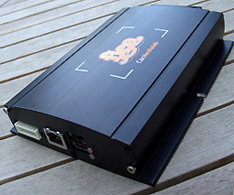| |
|
|
 |
| |
|
|
|
Researchprojects
|
|
|
| |
|
|

Research
Project PARCELMAN |
|
The Research Institute for
Operations Management (FIR) and the Institut for Work Science at the
RWTH Aachen (IAW) design a concept for more efficiency in last mile
parcel delivery. The technology approach and guideline in this project
is covered completely by adisoft. The focus herein in set on
mobile data communications and the integration of mobile data services
and applications in the logistics and process chain of such
companies. „ParcelMan” has been launched on the first of October
2001. Its goal is to enable messenger, express and parcel services to
deliver higher values and logistic services to their customers.
Technology-wise possible implementations and desirables have to match
employees and customers in order to become efficient for the business.
Having in mind that a numerous new demands are raised for delivery
services by the growing influence of electronic data exchange in
business processes, we face the challenge to provide solutions that
covers the touched areas all alike:logistics, personnel policy measures
and technology.
Customers today expect to have control over the status of their
delivery in real-time. The distribution of goods has to be performed in
shorter and shorter time frames. Practically, these demands require a
total renunciation from the traditional process chains. Flexible
processes modules need to be introduced that incorporate the customer.
The service employee on site the „ParcelMan”, will gain more
responsibility within the whole business process and he will operate on
a higher level of decision making and service quality. Nevertheless,
the workload for these employees may not grow.
So the project aims to enable value-added high quality services to
todays portfolio and provide the necessary control and management tools
for this approach. The technology target is to provide a
sustainable IT infrastructure plus guidelines on how to introduce it
operationally.
For further information please visit: www.parcelman.de |
| |
|
|
| |
|
|

Research Project VIVIAN |
|
Mobile communications,
personal computing and distributed information services and
applications come together. Existing commercial platforms for mobile
devices need a technology push to fulfill the demands of this new
market.
In the future, mobile users of such distributed information services
will obtain accompanying information when asking for an address (for
example). Possible adds in case of address researches may be a detailed
map and routefinder as well as historical information and opening
hours. The aim of adisoft in this project has been to identify, design
and implement a platform for reliable and secure mobile data
communications within a components-based architecture that is completed
and implemented in various devices through the cooperation partners.
This platform offers open and state-of-the-art interfaces based on
accepted standards. This way, a compatibility guide allows all
applications to apply the given functionality. Due to the market moves
in devices and mobile applications Java technology has been chosen for
the user application interfacing.
The VIVIAN project wants to provide such a platform in order to enable
thrid parties to make their applications mobile without huzzles. A
variety of software problems had to be solved on the way. But the
VIVIAN projects succeeded in providing the platform plus a number of
applications that demonstrate how add-on services can be integrated,
how they add to the mobile users convinience and how sustainable
technology can help the market grow. The specification and description
of the VIVIAN platform is available to developers of mobile
applications in terms of Developer's Guide. The VIVIAN Internet
homepage makes these research results available to the public.:
For further information please visit: www-nrc.nokia.com/Vivian/ |
| |
|
|
| |
|
|

Research
Project Car-Flash |
|
car-flash - Remote
update of vehicle controllers
In new vehicles, especially cars, you will find about 70 different
controlles for higher safety, user comfort and entertainment. Although
these components have very different tasks to fulfill, they have to
communicate and interoperate with each other. in complex car network
and process scheme. Errors in the software of one single controller can
generate misbehaviours of otherwise correctly working components, and
so the whole network functionality may become error-prone and
instable. Manufacturers have to find ways to prevent such
interworking error situations in their vehicles. This is the only way
to reduce the number of cost-intensive call backs or controller update
necessities within standard maintenance routines.
CarMediaLab (Bruchsal) and adisoft systems (Berlin) cooperate in a two
years project (until end of 2010) which wants to show a prototype that
will enable controller flash updates over the air. This project is
founded by the German Federal Ministry for Economy and Technology based
on a resolution of the German Parliament. First task within the project
is to define the operational scenario for such remote flash updates,
i.e. the actual conditions needed for an update, rollback mechanisms to
recover from faulty updates or other failure situations and the match
of minimum computing ressources that can be provided by some embedded
car system (size, energy consumption, etc.). The prototype is meant to
run in experimental vehicles and test carriers of the manufacturers.
These fleets are operated for various evaluations and their number is
somewhere in the four-digit area. The mobile update distribution allows
optimized and centralized control of a homogenous software flash
covering all vehicles. This way the frequently required updates in
experimental fleets can be managed in a much shorter time and with
under total control. Via successful operation within experimental
cars the solution will be transported to the mass production later.
|
| |
|
|
|
|

